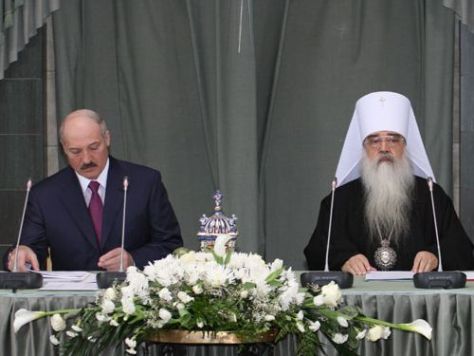“The Church urges to introduce regulations in place on legislative levels for the internet content in a similar way how it is done in other countries, for instance, in the People´s Republic of China.” This announcement by Metropolitan of Minsk and Sluck Filaret was immediately covered by all official mass media in Belarus.
The Church head is convinced that “a virtual reality chaos” and contained in it “immoral information” is dangerous for children’s and teenagers’ mental health.

These sorts of announcements are not really new for the Belarusian Association of Journalists (BAJ) and other independent experts. The only difference is that they have been common among the state and security officials rather than clergy. Barys Tumas, a Naša Niva independent weekly columnist, commented: “Colonels speak through the metropolitan.” Filaret’s speech on internet was announced during his meeting with the authoritarian ruler of Belarus Aliaksandr Lukashenka.
Observers have no doubt that allusions to ‘the Chinese experience’ imply an attempt to rid the net of any alternative thought. According to one of the versions, the idea as such was formulated not within the Church but in the corridors of power. The Church head only allegedly announced what the statesmen found awkward to say out loud, since they are busy imitating ‘liberalisation.’
In Belarus the internet is practically the only universally available source of alternative information. The share of net users increases rapidly and is bigger that those in neighboring the Russian Federation or Ukraine.
 Andrei Bastunets, a BAJ deputy chair, right, comments: “It is rather surprising that the senior clergy member is trying to influence secular affairs. As it is often the case, reasons for formulating certain important decisions can by drawn from opinions of individuals who do not necessarily have expertise in a field. Making any comments and allusions to ‘the Chinese experience’ seems like utter non-sense in a civilised society.”
Andrei Bastunets, a BAJ deputy chair, right, comments: “It is rather surprising that the senior clergy member is trying to influence secular affairs. As it is often the case, reasons for formulating certain important decisions can by drawn from opinions of individuals who do not necessarily have expertise in a field. Making any comments and allusions to ‘the Chinese experience’ seems like utter non-sense in a civilised society.”
The Belarusian metropolitan’s rhetoric caused an outrage not only in the independent media of the country but also in the mother church in Moscow. The Russian Orthodox Church does not share the enthusiasm of their Belarusian ‘brothers in alms.’ Mikhail Prokopenko, a head of communications service with the Department of external church relations of the Moscow patriarchy, commented to interfax.by that restricting internet activity “will lead to nothing.” He also remarked that in the whole world any initiatives related to the restriction of internet brings up a question of “censorship, primarily a political one.”
The Belarusian Orthodox Church is subordinate to Moscow and does not have an autonomous status of its own. Still it is the only church in Belarus which enjoys a strong support of the state and returns like for like. Meanwhile, catholic and protestant minorities report discrimination facts regularly.


